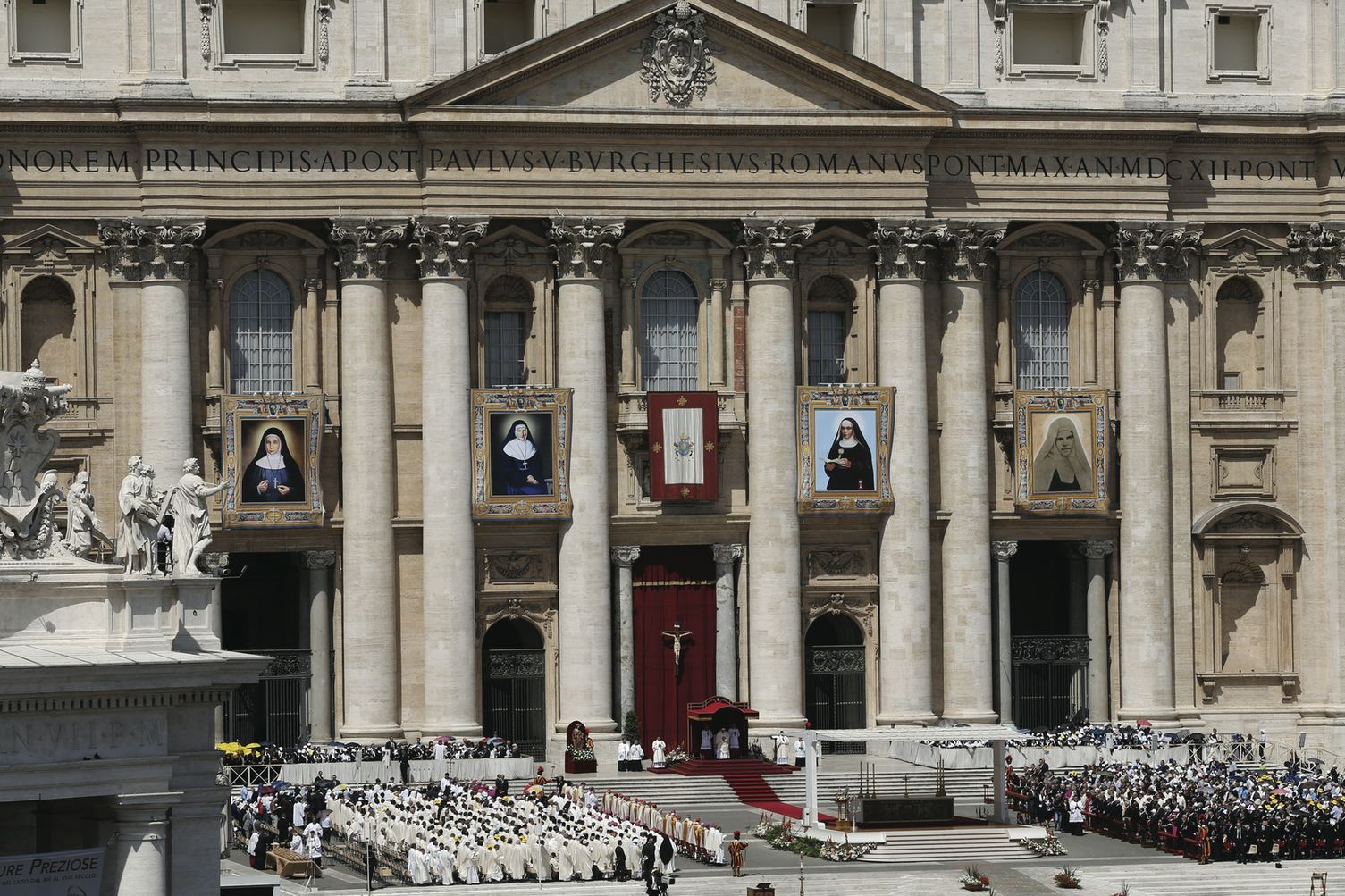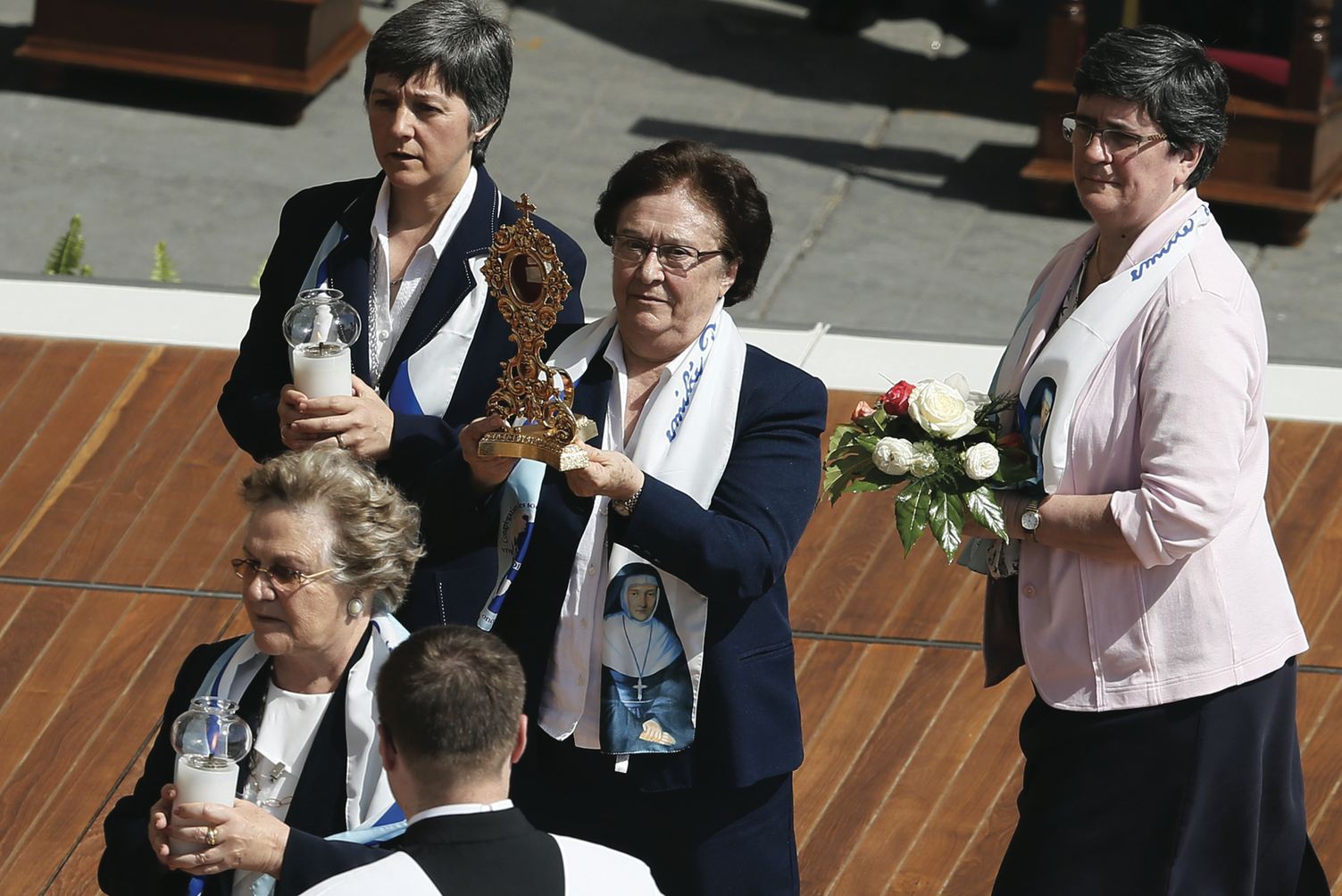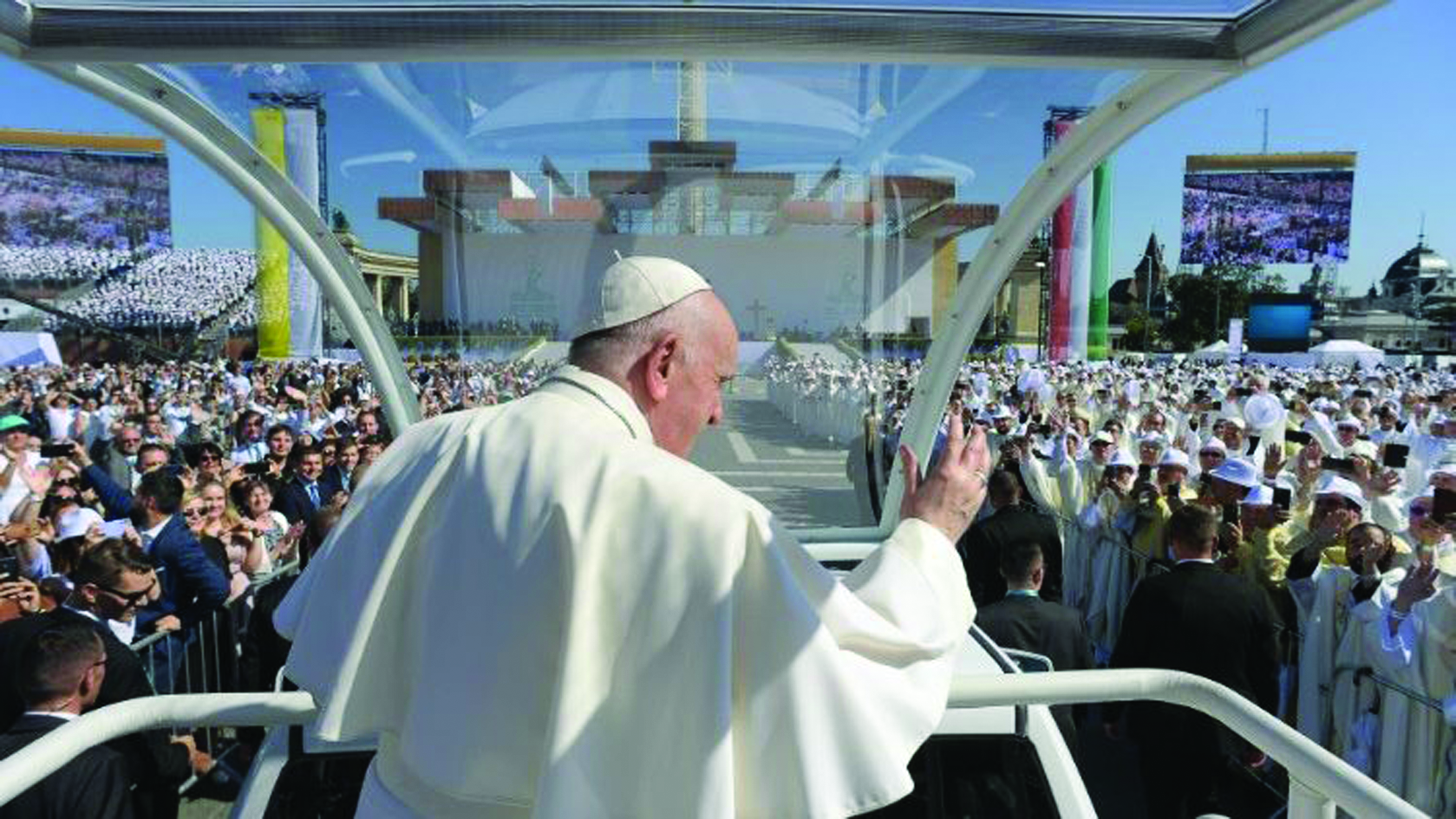
Banners showing the new saints hang from the facade of St. Peter’s Basilica during their canonization Mass celebrated by Pope Francis in St. Peter’s Square at the Vatican May 17.
Pope Francis ignited a firestorm the day before the May 17 canonization of four new saints, two of them Palestinian women, when he exchanged gifts with Palestinian President Mahmoud Abbas and uttered a now-famous remark expressing the hope that Mr. Abbas would be an instrument (an “angel”) of peace in the war-torn land of his people.
According to the Italian journal La Stampa: “As is tradition with heads of State or of government, Francis presented a gift [a medal of the ‘angel of peace’] to the Palestinian leader, commenting: “May the angel of peace destroy the evil spirit of war. I thought of you: May you be an angel of peace.”
Pope Francis had called Abu Mazen [Abbas] a “man of peace” when he visited Bethlehem in May 2014, just as he had called the then Israeli prime minister, Shimon Peres, a “man of peace” during his subsequent visit to Jerusalem.
Initial English translations from the Italian disagreed because even those present were not sure whether the Pope had said “you are” or “may you be” (the verbs in question being similar-sounding sei and sia) a peace-bearing spirit — an angel, a messenger, of peace.
Media commentators quickly pounced upon the statement. The Israelis accuse Abbas of inciting the Palestinians to violence, and some decried the Pope’s words as an act of overt support for an aggressor against the state of Israel, and even for “terrorism.” One journalist for the Israeli Arutz Sheva online news saw in it confirmation that “the Catholic Church has always been at war with the Jewish State.”
Not surprisingly, the negative Jewish reaction to the Holy See’s signing a treaty with the “State of Palestine” just days before contributed to the overheated response. Israel’s Foreign Ministry said it was “disappointed” by the decision, though the Vatican has recognized Palestine since it was granted nonmember observer status by the UN in 2012. (Palestine is recognized by 135 nations worldwide; members of the British, French, Spanish and Irish Parliaments are urging that their countries follow suit.)
However, Emmanuel Nahshon, spokesman for the Israeli Foreign Ministry, said he heard a recording of the Francis-Abbas conversation, had consulted with the Israeli Ambassador to the Vatican and was satisfied that the Pope had said, “May you be an angel of peace.”
“He is far from an angel of peace,” Mr. Nahshon said of Abbas, adding, “If he was, perhaps by now there would be peace.”
But as Vatican analyst John Allen remarked: “In the biblical sense, an ‘angel’ is a messenger of God. The difference between terming Abbas a ‘messenger’ and a ‘man of peace’ thus isn’t that enormous, and in any event the point is clear — Francis believes Abbas is a statesman committed to the cause of peace, just as he believes the same thing about the former Israeli leader.”
Fr. Federico Lombardi, the Vatican’s spokesman, commented along similar lines: “He [Francis] offered a few words of explanation of the gift, as well as an invitation to a commitment to peace on the part of the recipient.”
Regardless of the exact wording, the intent was clear to those who were not anxious to impose a particular interpretation on the Pope’s words: as a man of peace himself, Pope Francis never ceases to encourage the world leaders he meets, of whatever political stripe, to be bearers of peace.
Francis: Like the New Saints, Give Witness to the Risen Lord
In his homily, the Pope reflected on what it means to be one of the twelve Apostles
Like the four new saints, Christians are called to “abide in God and in his love, and thus to proclaim by our words and our lives the resurrection of Jesus, to live in unity with one another and with charity towards all.”
These were the words of Pope Francis at the canonization of four new saints from Palestine, Italy and France. Among the dignitaries present was Mahmoud Abbas, President of the State of Palestine, and Latin Patriarch of Jerusalem Fouad Twal.
The Pope began his homily by reflecting on the Acts of the Apostles, in which Peter defines the mission entrusted to Matthias, who was chosen to replace Judas Iscariot.
“It is necessary that one of the men who accompanied us the whole time the Lord Jesus came and went among us, beginning from the baptism of John until the day on which he was taken up from us, become with us a witness to his resurrection,” St. Peter says in the reading.
The Holy Father said that Peter sums up “what it means to be part of the Twelve Apostles”: to be a witness of Jesus’ resurrection. “The fact that he says ‘with us’ brings us to realize that the mission of proclaiming the risen Christ is not an individual undertaking: it is to be carried out in common, with the apostolic college and with the community,” he said.
“Like the Apostles, each one of Christ’s followers is called to become a witness to his resurrection, above all in those human settings where forgetfulness of God and human disorientation are most evident.”
To Remain in the Risen Christ
Turning his attention to the newly canonized saints, Pope Francis stressed the importance of what St. John says in his letter: “to remain in the risen Christ and in his love.”
That love was exemplified in the life of Sister Jeanne Émilie de Villeneuve. The French saint, he said, “consecrated her life to God and to the poor, the sick, the imprisoned and the exploited, becoming for them and for all a concrete sign of the Lord’s merciful love.”
Sister Maria Cristina Brando, he continued, also gave witness of remaining faithful amid obstacles.
“She was completely given over to ardent love for the Lord,” he said. “From prayer and her intimate encounter with the risen Jesus present in the Eucharist, she received strength to endure suffering and to give herself, as bread which is broken, to many people who had wandered far from God and yet hungered for authentic love.”
Regarding the two new saints from Palestine, the 78-year-old pontiff said that both exemplified another aspect of giving witness to the risen Lord by showing “unity among ourselves.”
“Sister Mariam Baouardy experienced this in an outstanding way,” he noted. “Poor and uneducated, she was able to counsel others and provide theological explanations with extreme clarity, the fruit of her constant converse with the Holy Spirit. Her docility to the Spirit also made her a means of encounter and fellowship with the Muslim world.”

A banner showing the new Saint Marie-Alphonsine is seen as a family waits for the start of the canonization Mass for four new saints in St. Peter’s Square at the Vatican May 17.
“Sister Marie Alphonsine Daniel Ghattas came to understand clearly what it means to radiate the love of God in the apostolate, and to be a witness to meekness and unity,” he continued. “She shows us the importance of becoming responsible for one another, of living lives of service one to another.”
Concluding his homily, Pope Francis said that the lives of the four saints challenge Christians to bear witness to the resurrection of Christ.
To do this, he said, it is important to carry within the “joy of this encounter with the risen Lord.
“Let us cultivate in our hearts the commitment to abide in God’s love,” he said. “Let us remain united to him and among ourselves, and follow in the footsteps of these four women, models of sanctity whom the Church invites us to imitate.” — Zenit.org
President Abbas thanks the Catholic Church for the canonization of two Palestinian saints

Palestinian President Mahmoud Abbas greets Pope Francis at the conclusion of the Mass for four new saints at the Vatican
Palestinian President Mahmoud Abbas made the following statement ahead of the canonization of two Palestinian saints, Mariam Baouardy from Ibillin village in Galilee, and Marie Alphonsine Ghattas from Jerusalem:
“We thank God the Almighty for the blessings He has bestowed on two holy women from Palestine: Mariam Baouardy Haddad from Ibillin village in Galilee, and Marie Alphonsine (Sultana Daniel) Ghattas from Jerusalem.
“Our Holy Land has become a bastion of virtue for the entire world, and we are grateful to His Holiness Pope Francis and the Catholic Church for their observance and interest in the seed of virtue that has grown in Palestine. Palestine is not a land of war; it is rather a land of sanctity and virtue as God intended it to be.
“St. Mariam Baouardy Haddad was born in 1846 in Galilee during the Ottoman era and died in Bethlehem in 1878. She lived in Alexandria, Beirut and France. Since her childhood, she was no alien to pain and agony. She sensed the voice of God calling her to a life of spirituality, joined the Carmelite Order in France and dedicated her life to the Lord, who lavished upon her spiritual gifts and blessings. She prayed, interceded and did miracles, and in 1876 established a convent in Bethlehem which still exists until today. Nowadays the convent resonates with prayers for the relief of the suffering of the Palestinian people, Christians and Muslims alike.
“St. Marie Alphonsine was the name given to Sultana Daniel Ghattas after ordination [sic]. She was born in Jerusalem in 1843 during the Ottoman era and died in 1927 at the outset of the British Mandate over Palestine. St. Marie lived in the streets of the Old City of Jerusalem, which still holds the indelible traces of Jesus Christ. Until today Jerusalem is daily witnessing the suffering of the Palestinian people and affecting their human dignity and holy places. St. Marie set up the foundations for a monastic life for the women of Palestine and the Arab world known as the Holy Rosary Sisters, dedicated to their education and empowerment. Today the Holy Rosary Sisters have reputable schools in Palestine and in other Arab countries.
“Both St. Mariam Baouardy Haddad and St. Marie Alphonsine represent a generation of virtuous and pious women that are capable of confronting challenges and conveying a special message particularly in Palestine and in the Arab countries:
“It is an inspirational message which coincides with the commemoration of our people’s Nakbah of 1948, emphasizes our unity, and affirms our determination to build a sovereign, independent and free Palestine based on the principles of equal citizenship and the values of spirituality and sublime humanity. On this holy occasion we would like to express appreciation to our Palestinian Christian brothers for their steadfastness and effective contribution to building the Palestinian nation, and we call upon them to stay with us and not to be easily swept by the tide of migration. We call on Palestinian Christians to stay with us and enjoy the rights of full and equal citizenship, and bear with us the difficulties of life until we achieve liberty, sovereignty and human dignity. Through truth and justice we can decide our own fate, and with the prayers of sincere and faithful believers all our endeavors will be realized.
“St. Mariam Baouardy Haddad and St. Marie Alphonsine are two daughters of our people representing a unique and powerful voice that tells us that the power of spirit is in us and guides us toward the State and its capital Jerusalem.
“A woman from Ibillin village in Galilee, St. Mariam Baouardy Haddad teaches us that God is for the oppressed because she was oppressed and she faced hardships and suffered from displacement. But later she devoted herself to spiritual life and established the Carmelite Convent in Bethlehem.
“St. Marie Alphonsine (Sultana Daniel) Ghattas who emerged from the heart of Jerusalem tells us that the city of Jerusalem will always remain the city of God and the city of justice and peace for all believers of all faiths. Jerusalem, St. Marie told us, will remain a spiritual heart for every believer in the world. We say: Based on this spiritual foundation, Jerusalem will be our capital, God willing.
“These two Palestinian saints add a very distinctive dimension to our national struggle, namely the moving humanitarian and spiritual principles that our land inspires us with. The land that God has made sacred, the land of dialogue between heaven and earth, God and man, and man and man. These are the uplifting spiritual principles that Christians and Muslims share in our Holy Land, and they are the same principles that we seek to form, the bases for the establishment of our State and for our national and social life.
“As we celebrate this holy occasion, we would like to congratulate our brothers and sisters in Ibillin as well as in Jerusalem and the rest of Palestine and the whole world. We reiterate our gratitude to the papacy of the Catholic Church for the canonization of two nuns from Palestine. We ask God Almighty to lead us all and guide our steps towards the achievement of justice, peace and tranquility in Palestine and the whole world.”









Facebook Comments